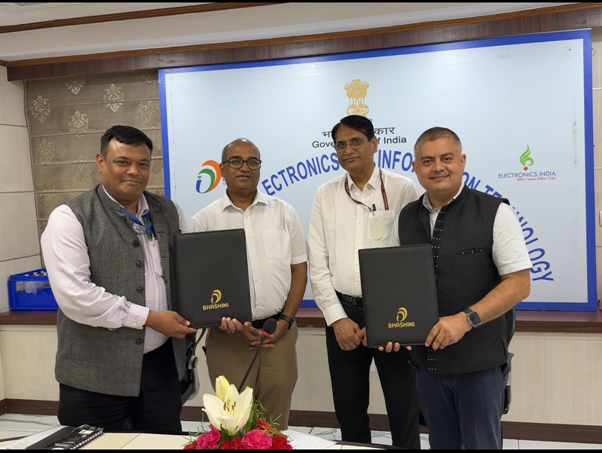BHASHINI-Mizoram Pact Heralds Inclusive, Multilingual Digital Governance
Shri Abhishek Singh added, “With this MoU, BHASHINI is proud to support Mizoram in enabling multilingual governance and fostering innovation rooted in the state's linguistic diversity.”

- Country:
- India
In a pioneering stride towards linguistic inclusion and equitable digital access, the Digital India BHASHINI Division (DIBD) and the Government of Mizoram have officially entered into a landmark Memorandum of Understanding (MoU). This strategic partnership, signed on June 18, 2025, at the Ministry of Electronics and Information Technology (MeitY) office in New Delhi, is poised to transform the state’s governance landscape by integrating multilingual language technologies that empower the Mizo-speaking population.
A Landmark for Regional Language Technology
The collaboration will see BHASHINI’s cutting-edge platform being integrated across governance systems in Mizoram, providing citizens access to essential services and information in their native Mizo language. This aligns with India’s broader goal of “Digital for All”, ensuring no citizen is left behind due to linguistic barriers.
Presiding over the MoU signing ceremony were several senior dignitaries:
-
Shri Khilli Ram Meena, IAS, Chief Secretary, Government of Mizoram
-
Shri Abhishek Singh, IAS, Additional Secretary, MeitY
-
Shri Amit Sharma, IAS, Secretary, ICT and Cooperation, Government of Mizoram
-
Shri Amitabh Nag, CEO, Digital India BHASHINI Division
Senior officials from MeitY, DIBD, and Mizoram’s ICT Department also participated, underlining the collaborative effort this initiative entails.
Voices from the Leaders
Shri Khilli Ram Meena, Chief Secretary of Mizoram, emphasized the cultural and strategic significance of the MoU, stating, “This partnership with BHASHINI will make digital governance truly accessible to every Mizo citizen. By preserving our language while embracing technology, we are building a more inclusive digital future for Mizoram.”
Shri Abhishek Singh added, “With this MoU, BHASHINI is proud to support Mizoram in enabling multilingual governance and fostering innovation rooted in the state's linguistic diversity.”
Shri Amit Sharma highlighted the governance impact, remarking, “This collaboration ensures that our tribal communities can access digital services in their native language, making governance more inclusive and culturally sensitive.”
Shri Amitabh Nag, CEO of BHASHINI, remarked, “This is not just a technology deployment—it is a co-creation of governance that speaks the language of the people. BHASHINI is proud to help shape a future where language, technology, and governance evolve hand-in-hand.”
Four Strategic Pillars of the Collaboration
The Mizoram-BHASHINI partnership is built on four foundational pillars that emphasize technology-driven linguistic inclusion:
1. Enhanced Citizen Services
The partnership will deploy tools that enable access to government schemes, documents, notifications, and grievance redressal in the Mizo language. Departments across Mizoram will be equipped with translation and speech recognition tools that ensure comprehensible and timely communication.
2. Inclusive Governance
By removing language barriers, the MoU promotes decentralized participation, especially from rural and tribal communities, reinforcing trust and transparency in the administration. This reflects the Government of India’s Digital India mandate to democratize technology access.
3. Digital Empowerment
The initiative ensures technology inclusion regardless of language, allowing citizens—especially the elderly, women, and underserved populations—to interact seamlessly with digital portals, mobile apps, and helplines.
4. Mizo Language AI Advancement
A core component of the agreement is the co-development of AI datasets and translation models in Mizo. The partnership aims to enrich India’s multilingual AI ecosystem by creating culturally relevant tools for machine translation, speech synthesis, and text-to-speech services.
Upcoming: BHASHINI Rajyam Workshop in Aizawl
To catalyze the implementation phase, a BHASHINI Rajyam Workshop will be held soon in Aizawl, Mizoram’s capital. This event will bring together:
-
State-level administrators
-
Language technology experts
-
Policy-makers and community leaders
-
Representatives from tribal and rural governance bodies
The workshop will serve as a launchpad for programmatic integration, capacity building, and the customized rollout of BHASHINI solutions across government departments. Training modules will ensure frontline staff are equipped to use voice and translation interfaces effectively.
Preserving Identity Through Technology
At its core, the BHASHINI-Mizoram MoU represents a model for linguistic preservation through digital modernization. In a nation with over 120 major languages and 22 scheduled languages, this collaboration offers a blueprint for region-specific digital transformation without sacrificing cultural identity.
This move is also a historic first for Northeast India, where linguistic diversity often intersects with geographical and technological challenges. The initiative offers a scalable model for other states with significant indigenous language populations.
A Shared Vision for a Multilingual Digital Bharat
This collaboration is part of the broader Digital India BHASHINI Mission, launched to build language-neutral digital access frameworks and develop language datasets, open-source tools, and AI models in Indian languages.
Backed by MeitY, DIBD’s national roadmap aims to onboard state governments, academic institutions, AI startups, and linguistic communities to co-develop tools for translation, search, speech-to-text, and natural language processing in Indian languages.
The Mizoram MoU is a significant step in this journey—affirming that language should never be a barrier to development, governance, or digital participation.
- READ MORE ON:
- BHASHINI
- Digital India
- Mizoram MoU
- Mizo Language Technology
- Multilingual Governance
- Inclusive Digital Access
- Tribal Empowerment
- Language AI Models
- MeitY
- Digital Inclusion India
- BHASHINI Rajyam Workshop
- Mizo Translation Tools
- Governance in Native Language
- Digital Public Infrastructure India
- Linguistic Empowerment










